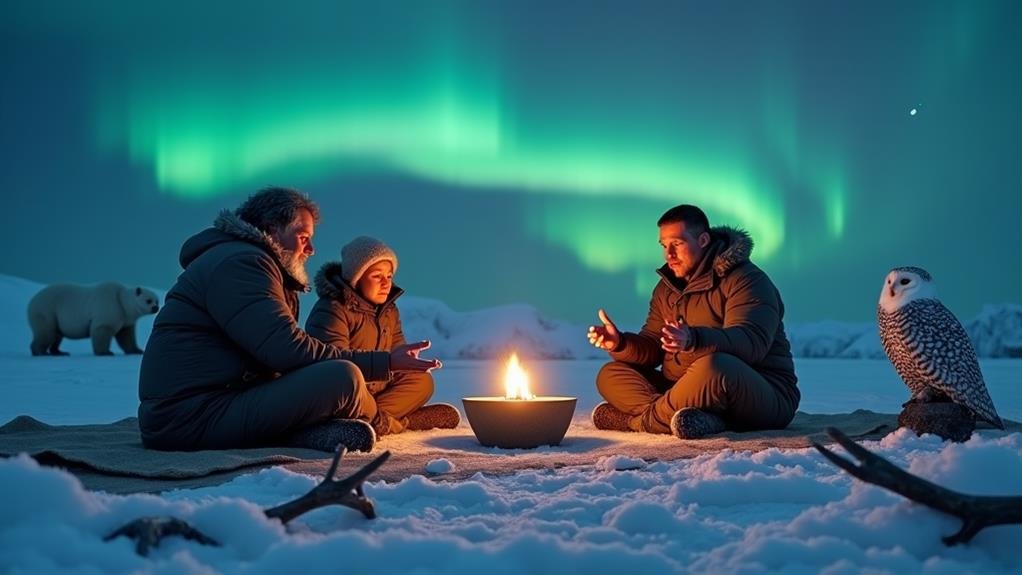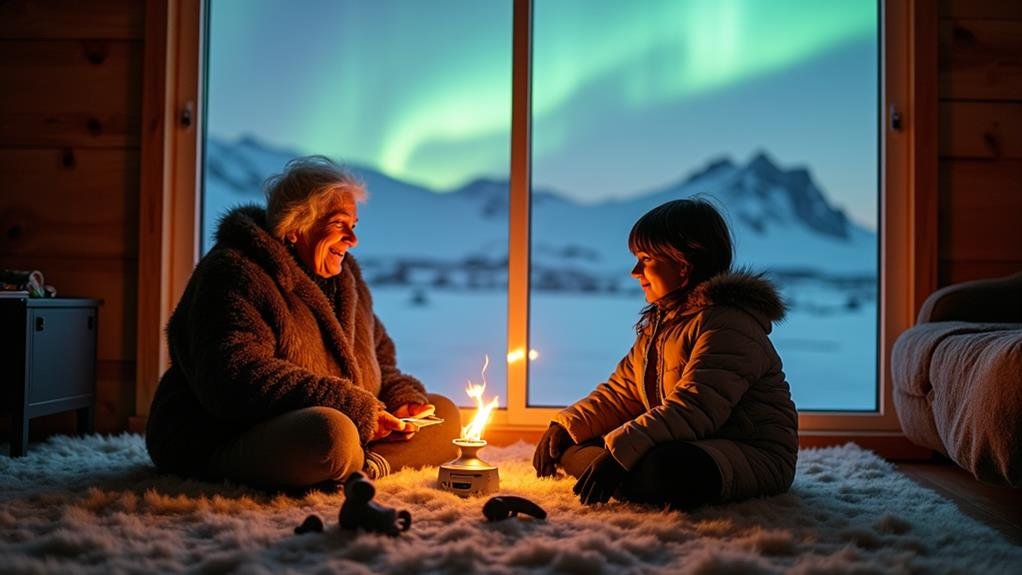In the heart of the Arctic, where ice and wisdom intertwine, Inuit storytelling hasn't merely entertained—it's sustained entire communities for countless generations. Through the practiced voices of elders, tales of survival, morality, and ancestral knowledge flow like rivers beneath the frozen tundra, nourishing young minds with fundamental teachings. While modern technology reshapes the Arctic landscape, these oral traditions remain an essential bridge between past and present, connecting today's Inuit youth with the time-tested wisdom of their forebears. What mysteries and teachings lie within these ancient narratives that have proven so important to the survival of Arctic peoples?
Main Points
- Inuit elders share essential survival skills, cultural values, and moral teachings through storytelling sessions around communal fires.
- Animal characters in stories convey complex lessons about ethics, community responsibility, and respect for nature.
- Storytelling preserves ancestral knowledge by combining entertainment with practical wisdom about hunting, plants, and animal behavior.
- Cross-generational verification ensures stories maintain accuracy while adapting teachings to address contemporary challenges.
- Digital documentation and modern technology help preserve traditional Inuit stories while maintaining their cultural authenticity.
Ancient Wisdom Through Oral Tradition
Passing down wisdom through generations, Inuit storytelling serves as a cornerstone of cultural preservation and education. Through oral traditions, elders share invaluable knowledge that maintains their cultural identity and guarantees the survival of ancient wisdom. These stories, often shared around communal fires, weave together practical survival skills with deeper moral lessons that shape community values.
The power of Inuit storytelling lies in its ability to transmit complex knowledge in memorable ways. Through narratives featuring trickster spirits and other traditional characters, elders convey essential teachings about respect for the land, proper behavior, and the importance of maintaining strong community bonds. These stories provide crucial information about hunting techniques, animal behaviors, and plant uses, equipping future generations with the practical skills needed for life in the Arctic.
This oral tradition does more than preserve historical facts – it creates a living bridge between past and present. By sharing these stories, Inuit communities maintain their connection to ancestral wisdom while adapting these teachings to contemporary challenges, guaranteeing that knowledge and wisdom continue to guide each new generation.
Elders as Knowledge Keepers
At the heart of Inuit oral tradition stands the elder – a living library of cultural knowledge and wisdom. These knowledge keepers serve as their community's memory bank, preserving centuries of ancestral teachings through oral storytelling practices. Their role extends far beyond mere entertainment, as they shoulder the crucial responsibility of maintaining and transmitting cultural identity to future generations.
Elders create meaningful educational opportunities during storytelling sessions, teaching younger members about survival skills, moral values, and the critical importance of respecting nature. Through their guidance, they foster strong communal bonds and help reinforce social responsibilities that are essential to Inuit culture. Their stories carry profound lessons that have been carefully preserved and passed down through generations.
To guarantee the authenticity of cultural teachings, elders participate in a rigorous process of cross-generational verification. This practice helps maintain the accuracy and relevance of their stories over time. Through this dedicated approach to preserving knowledge, elders continue to play an irreplaceable role in keeping Inuit traditions alive and meaningful for contemporary community members.
Nature and Animal Symbolism

Animal symbolism weaves through the rich tapestry of Inuit storytelling, serving as a vital bridge between cultural wisdom and everyday life. Characters like the raven and polar bear embody essential virtues, teaching moral lessons through their actions and interactions. These stories reflect the deep connection between Inuit culture and the natural world, emphasizing respect for nature and environmental stewardship.
Through animal symbolism, Inuit storytelling reinforces the importance of community responsibility and cooperation. Characters demonstrate how individuals should work together, share resources, and support one another, mirroring the values that sustain Inuit communities. The anthropomorphic portrayal of animals helps listeners, especially children, develop empathy and understanding for both the natural world and their fellow community members.
These stories do more than entertain; they serve as powerful teaching tools that illustrate ethical decision-making and moral reasoning. By presenting complex ideas through familiar animal characters, Inuit storytelling makes abstract concepts accessible and memorable. This approach helps preserve and transmit cultural values while fostering a deep appreciation for the interconnectedness of all living beings.
Cultural Values in Stories
Deep within Inuit storytelling lies a complex tapestry of cultural values that shape individual and community behavior. Through the Indigenous practice of oral storytelling, these narratives serve as powerful vessels for transmitting essential knowledge and moral principles from one generation to the next.
At the heart of these stories, children learn fundamental values that strengthen their cultural identity and foster community resilience. The tales emphasize virtues such as honesty, cooperation, and respect for nature, which are woven into engaging narratives that capture young minds while imparting vital life lessons. Through these stories, children develop their moral compass and understanding of social responsibilities.
The storytelling tradition creates a unique platform where values aren't simply taught but experienced through shared emotional connections. As community members gather to share these tales, they reinforce the collective wisdom that has sustained their culture for generations. These narratives help children navigate complex ethical decisions while maintaining strong ties to their heritage and community values. The stories' enduring impact lies in their ability to blend entertainment with profound cultural teachings, ensuring the preservation of Inuit values through time.
Preserving Stories for Tomorrow

Modern efforts to preserve Inuit storytelling blend traditional methods with innovative approaches, guaranteeing these precious narratives survive for future generations. Indigenous stories serve as essential links between one generation and the next, carrying forward the strength and resilience of Inuit communities.
Today's preservation initiatives focus on four key strategies:
- Collaborating with elders to document oral stories through written and digital formats
- Creating supportive environments where children can engage with their Indigenous culture
- Developing educational resources that incorporate traditional fables into modern learning
- Using technology to record and share storytelling sessions across communities
Communities are working diligently to preserve their histories through both traditional and contemporary methods. Elders work alongside younger community members to guarantee that storytelling remains a vibrant part of daily life. Through these efforts, children not only learn their ancestral tales but also develop stronger connections to their cultural heritage. The integration of modern technology helps make these stories more accessible while maintaining their cultural authenticity. This balanced approach guarantees that Inuit storytelling traditions continue to thrive, adapting to contemporary needs while honoring age-old practices.
How Does Inuit Storytelling Reflect Their Spiritual Connection to the Land and Spirits?
Inuit storytelling is deeply rooted in their relationship with nature and the unseen forces around them. Their oral traditions often depict the sacred bond between humans, animals, and the earth, emphasizing inuit spirituality and land. Through these stories, generations have passed down an understanding of survival, respect, and the mysteries of existence.
Conclusion
Like a flowing river carving its path through generations, Inuit storytelling weaves an unbreakable thread between past and present. It's through these timeless tales that wisdom flows, nourishing young minds with the essential nutrients of survival, morality, and cultural identity. As elders breathe life into ancient narratives, they're not just preserving stories – they're cultivating the seeds of tomorrow's knowledge keepers in the fertile soil of tradition.


